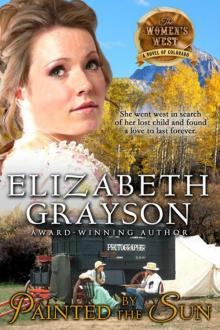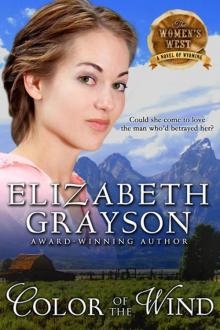- Home
- Elizabeth Grayson
So Wide the Sky Page 2
So Wide the Sky Read online
Page 2
"That'd be yours, Captain."
"Then let him take it. Have him head for the top of the hill and circle east. Let Major McGarrity know we need reinforcements. Tell him we'll hold on here as long as we can."
As the wiry sergeant scuttled away to do the captain's bidding, Jalbert resumed his place behind the rocks.
"The sentries are posted at the rear, sir. I took a good look around up there myself. There isn't anything to see for miles. My guess is that Standing Pine headed straight for the village with those supplies."
"Very good," Reynolds answered, his attention shifting again as the riders who had been circling at the far end of the draw began to form up for another charge.
"Captain," Jalbert asked, reclaiming Drew's attention, "what about the woman?"
Reynolds turned to where the Indian captive crouched in the shadow of the jumbled stones. What was going on behind those empty eyes? he found himself wondering. Where did this woman's loyalties lie?
Without answering Jalbert, Drew shifted the pressure on the woman's arm, forcing her down beside him, onto her back. He jammed his knee between her legs, pinning the drape of her buckskin skirt to the ground.
"I think it's best, Mr. Jalbert," he answered, "if I keep her here with me."
Reynolds saw the distaste in the scout's dark face as he turned to go, but it didn't matter what such a man thought. Drew had learned early how treacherous Indians could be—and he wasn't sure he could trust this one any more than the rest.
As the beat of the Indian charge grew louder, Drew glanced down, addressing the woman. "I don't know what you think or what you want, but until this is over, you just lie quiet. If you give me so much as a lick of trouble, you'll wish you'd stayed with the savages."
He wasn't sure she understood his words, but his meaning seemed clear. The woman closed her eyes and turned her face away.
Then the horsemen charging up the valley claimed all of Drew's attention. It was as if the Cheyenne rode in some primitive ballet: the horses and riders a blur of grace and speed, of fury and daring, sweeping toward them over the windswept ground.
His appreciation didn't stop Drew from snatching up the sergeant's rifle, notching it into his shoulder, and sighting on one of the lead horsemen. The brave and his mount went down hard. More riders swarmed in his place, circling and firing. One of the men to Drew's left fell back, an arrow in his shoulder. He heard Sergeant O'Hearn cursing farther down the line. His hat was gone and blood was streaming from a gash at his hairline.
Still, the troopers held their own. Five or six Indians rushed their left flank and were driven back. A few breached the rocks and the line of soldiers. From the corner of his eye Drew saw Jalbert shoot one of the braves from his horse. He wrestled a second to the ground and dispatched the man with the war club Drew had seen tied to his saddle. Reynolds gave an almost imperceptible nod. The mixed-blood could be trusted, at least this far.
Then, as if by some prearranged signal, the Indians withdrew.
"Hold your fire!" Drew shouted, and quickly reassessed the situation. He knew his men could never bear up under continued attack. They were hopelessly outnumbered, and wounds had begun to take their toll. One of the muleteers lay dead, and two more men were moaning in agony.
"Jalbert," Drew called out and waited for the scout to appear. "Is there another way out of here?"
The scout spared a glance for the woman, then shook his head. "Even if we were able to retreat a few at a time, it would end up a race back to the fort. And carrying our wounded, we couldn't win."
Reynolds acknowledged the half-breed's assessment. They were safer here than they would be if they left the cover of the rocks. Still, this was damn grim business.
Already the band of riders at the far end of the draw was winding up for another attack.
Then from the south came the sound of a bugle. Both Drew and Jalbert perked up like hounds on point. The familiar notes of the call to arms drifted to them, clearer than before.
The Indians seemed to hear it, too. The whirlwind of riders began to unwind as a column of bluecoats emerged from the dip of land to the south.
"It's Captain Parker," Jalbert reported, climbing to his feet to watch the fresh troops fan out to the right and left. From behind their makeshift breastworks, a cheer went up. "Parker must have been out on patrol when our man reached him."
"The Cheyenne see Parker, too," Drew observed, rising to stand beside the scout. Relieved of his weight, the woman who had been sprawled beneath him curled and drew her knees up to her chest.
As the line of soldiers advanced, the clot of warriors at the far end of the draw scattered in all directions like a good break on a billiard table.
Parker's troops pursued them, but from where Reynolds stood he could see that they'd never catch the Indians. He was beginning to appreciate the army's frustration at the way Indians could disappear into this country like barn mice into a hayloft.
At the midpoint of the draw, Captain Parker left the main body of his men. These seasoned troops would ride down the hostiles as best they could.
Reynolds bent and caught the Indian captive's wrist. He pulled her to her feet as Parker approached. "Well, whoever you used to be, madam," Reynolds told her, "whoever you are now, I'm taking you home. And God help you when we get there."
Chapter 2
The solid wood-and-stone structure of the North Platte Bridge spanned the wide churn of coffee-brown water. It breached the gap between the mat of yellow grassland that rolled off to the north and east and the windswept foothills that rose in humps toward the snowy, pine-capped summit of the mountains to the south. At the far end of the bridge, on a bend in the wagon road that had carried thousands of settlers to Oregon, sat the United States Army outpost of Fort Carr.
An unprepossessing cluster of log and rough-sawed buildings, of half-finished barracks and tents, the fort was still impressive enough to make Sweet Grass Woman stiffen in the saddle. She sat even straighter than before, though for the length of their ride she had refused any warmth or comfort that might be afforded by her proximity to the cavalry officer whose horse she shared.
She refused to accept anything from such a man. He believed that she had helped Standing Pine lure him and his men into an ambush. He had shamed her by forcing her to lie beneath him in the dirt, shamed her by thrusting his knee between her legs as if she were a common woman to be taken at his will. Even now he rode with one hand twisted in the belt at her waist as if she were his prisoner.
But Sweet Grass Woman knew very well what she was and took no joy in it.
The sentries who guarded the gate at the north end of the bridge snapped to attention as they approached, but not even the strictest military discipline could prevent one of the troopers from breaking rank and gesturing to his cheek as they passed by. His reaction to the tattoo the Kiowa had etched into her face made the breath catch in her throat. Sweet Grass Woman knew these men were only the first of many who would stare, speculate, and scorn her in the days to come.
The column rumbled onto the bridge's cottonwood decking, the sound of the horses' hooves on the planks reverberating inside her chest. An icy wind tore at her hair and clothes, chilling her to the marrow of her bones. Crossing the river seemed to take forever.
When they finally reached the southern bank of the river, the captain shouted orders, and the troopers melted away, some to stables, some to dismount before tents and barracks, a few to seek the small separate building where there must be someone who cared for the wounded and prepared the dead for burial.
It was only her captor and his scout who continued around the end of a row of buildings and onto a half-built parade ground. A flag she'd once thought of as her own snapped in the wintry breeze.
They were just drawing up before the large log building at the northern end of the field when an officer came out onto the narrow, covered boardwalk that ran across the front. At the sight of them, a scowl gathered his mouth so tight it all but disappeared i
nto the bristle of his beard and mustache.
The captain dismounted from his horse and dragged her down. His grip was painful, almost insulting. It took every bit of her determination to keep from twisting away. With a hand on her elbow, he maneuvered her to stand at the foot of the wooden steps.
The older man loomed over her, his gaze sliding up from her moccasined feet to her buckskin dress, from her vermilioned hair to the crest of her cheek. The star-burst tattoo stung as if it had been cut and colored only the night before.
"...this... captive... goods for?" he demanded.
Sweet Grass Woman strained to make sense of the big man's words. She had spent three years as a slave to the Kiowa and six with the Cheyenne. It had been nearly seven years since she'd heard English spoken aloud. She trembled in frustration at the sound of it, angry with herself for needing so desperately to understand, appalled by how little of her native tongue she had managed to remember.
"We... gave... wagon... goods... get... captive..."
The big man nodded. "...said... you... trouble... Cheyenne?"
The men's words came in a torrent after that, too thick and fast for Sweet Grass Woman to grasp. She knew they were discussing the meeting with Standing Pine, the ambush, and her. Her return. Her fate.
She strained closer, aching to make some sense of what they were saying.
As the two men talked, a crowd began to gather. There were troopers in sweat-stained shirts and dusty canvas pants. A cluster of traders and buffalo hunters wandered up and stood off to one side, their eyes alight with speculation. Three women in bonnets and swaying skirts came rushing from one of the cabins at this end of the compound. They stopped dead in their tracks once they got a look at her. Settlers who'd been shopping at the trading post up by the bridge ambled over to find out what was happening.
The shame of being forced to stand there on display sent humiliation seeping hot beneath her skin. She linked her fingers and held on tight, fighting to keep her hands from her burning cheeks, to keep from acknowledging the many ways the Kiowa had marked her.
The murmurs came as she knew they would, tainted with sympathy, disdain, and horror. They came in a language that shouldn't have seemed so foreign in her ears. With the hiss of incomprehensible words, the crowd and the buildings and the dread closed in. The smells of sweat and onions and the white man's privies. The musky taste of fear and the burn of bile in the back of her throat. Her muscles twitched with a need to run.
Then she caught sight of the mixed-blood scout with his close-cropped hair and his white man's clothes, standing a little way apart. His face was broad and bony and impassive. In spite of his expression, she recognized the pity in his eyes. And it shamed her.
From somewhere deep in the bedrock of her soul, she dredged up pride enough to glare at him. To square her shoulders, to lift her chin.
She had relied on pride to see her through worse times than this. Pride had kept her from screaming and cowering as Julia had when the Kiowa took them. It helped her endure the years of beatings and servitude, helped her bear the shame of being marked and gambled away to the Cheyenne.
But pride could not ease the turmoil in her blood or slow the wild, fierce thunder of her heart. She was afraid, afraid in a way she had never been before. Afraid of what she'd been and what she'd become. Afraid of what might happen after this.
In the years of her captivity, she had learned to fear for things not nearly so intransigent as her death.
The crowd fell still when the older officer turned his attention from the captain to her.
"You... English, girl?" he demanded, raising his voice. Sweet Grass Woman shook her head. She didn't understand English well enough to grasp more than bits of what he was saying. She couldn't remember nearly enough to make herself understood.
"...you tell... name... you tell... you come from?"
She shook her head again. She didn't know the words for Vih o ots He?e in this other tongue.
The people gathered at the edge of the parade ground watched and waited. The air grew thick with questions, curiosity.
The officer frowned, as if he were trying to decide if her silence was one of genuine confusion—or simple defiance. She could sense his mounting frustration, his annoyance with her.
At the periphery of her vision she could see the mixed-blood scout. She could tell by the way he pursed his lips that he could make her understand, help her answer, but he could not do that unless the bearded man asked.
Then he inclined his head and lowered his eyes.
Sweet Grass Woman instantly understood what he meant and did the same.
In that moment of submission, the tension between her and the man at the top of the steps seeped away.
"Me"—he thumped himself soundly on the chest, trying to communicate another way—"Major Ben McGarrity."
She nodded.
"You?" He pointed at her.
She stared back, realizing that before she'd misunderstood. He wanted her English name, not the name the Cheyenne had given her. He wanted to know who she'd been when she was fifteen and traveling down the Santa Fe Trail with her family—not who she was now.
To Major Ben McGarrity Sweet Grass Woman didn't exist. To him Pale Eyes, as the Kiowa had called her, had never existed. To him, to the captain, to these white men and women, she had not existed for nine long years. A shudder ran the length of her back. Only if she could give her English name would she exist for them again.
She wet her lips and groped for the unfamiliar syllables. She shaped her mouth around them for the first time in so very, very long.
"Cas-san-dra." She spoke the word so softly Ben McGarrity had to lean closer to catch it. "Cas-san-dra M-M-Mor-gan."
He smiled at her as if delighted by her accomplishment. It was like the moon coming out from behind a cloud. She was a person again in this white man's eyes.
She wondered if by reclaiming her white name, she had ceased to exist for the Cheyenne. In spite of an inexplicable sense of loss, she felt her face warm at McGarrity's pleasure.
"Cassandra Morgan," McGarrity announced to everyone who had been straining to hear. "Her name is Cassandra Morgan."
She heard her name echoed in a score of voices as the people in the crowd repeated it among themselves, shaking their heads.
Amidst the buzz came a single, strangled word. A voice strained with incredulity.
"Cassie?"
She turned to seek the source of her name, the diminutive her family and friends had used when she was a child. She turned to where the cavalry captain stood. His face was slack, the bleached-out color of the winter sky.
"Cassie," he breathed again. She could hear the hope and dread mingled in his tone. His gaze moved over her as if he were seeking the truth in her features and not her words. "Cassie?"
She studied him, too, wondering who he was, looking for some hint to his identity. What she saw before her was a tall, broad-shouldered man, a few years older than she was herself; a somber man with a long jaw and resolute mouth, draped in a bristly brown mustache. She saw side-whiskers creeping down to accent his hollow cheeks, a fringe of wavy, chestnut-colored hair flaring at the edge of his collar. Deep creases crimped the corners of his eyes, whose color was the cold, clear gray of Navajo silver.
Something about his eyes stirred recognition way down deep, miles below the level of conscious thought. It made her mouth go dry, made the breath hover in her throat.
He nodded once, as if he had reconciled some question inside himself. Or inside her.
Touching the center of his chest, he spoke, his voice prodding, testing her. "It's Drew. Drew Reynolds."
Disbelief spiraled up inside her ribs, evaporating every dram of air. Her hands tingled. Her head went light.
Drew?
The memory of another time came flooding back. Drew Reynolds had grown up on the farm adjoining theirs in the hills of Kentucky. He was the boy Cassie Morgan had followed around and idolized for as long as she could remember. Drew
Reynolds had been her first playmate, her first nemesis. Her first love.
But Drew was dead. She had seen him fall with an arrow in his back during the attack on their families' wagons. She'd seen him die. Even in the fear and brutality and turmoil of the first months of her captivity, she had grieved for him.
This couldn't be Drew alive before her now. This couldn't be Drew, the army captain who had handled her so callously—and with such contempt.
McGarrity's voice boomed above them, demanding explanations. "Captain Reynolds... this woman... you know?"
She stared at the man who claimed to be her childhood friend, still not sure that he was who he claimed to be. Yet somehow she could make more sense of what he was saying than she had been able to make of any of the English she'd heard spoken until now. Perhaps she understood because she knew he was explaining to Major Ben McGarrity about how their parents decided to leave Kentucky for a better life, about the trip down the Santa Fe Trail, and the Kiowa attack. Perhaps she understood because the echoes of her own lost language were beginning to stir inside her.
Once Drew Reynolds had finished explaining about the past, McGarrity motioned the three women forward. In the thick babble that followed Reynolds's revelations, she managed to catch a few of the major's instructions. She heard him tell the women to "take... scrub... good," to "make... presentable."
The women shifted their gazes from McGarrity to her, their expressions marked with dismay. The woman in the flower-trimmed hat, the sweet-faced one a few years younger than the major, addressed him at some length. From the way he listened to what she said, Sweet Grass Woman surmised she was McGarrity's woman, McGarrity's wife.
The major's mouth narrowed at the corners before he waved a young sentry in their direction.
As the women moved away, the sentry took Sweet Grass Woman's arm. Instinctively she jerked her elbow free.

 A Place Called Home
A Place Called Home Painted by the Sun
Painted by the Sun So Wide the Sky
So Wide the Sky Color of the Wind
Color of the Wind